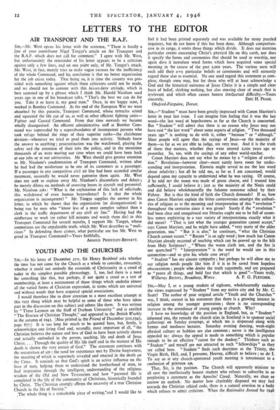LETTERS TO THE EDITOR
AIR TRANSPORT AND THE R.A.F.
SIR,—Mr. West opens his letter with the sentence, " There is hardly a line of your contributor Nigel Tangye's article on Air Transport and
the R.A.F. which does not call for comment." I agree with Mr. West, but unfortunately the remainder of his letter appears to be a criticism against only a few lines, and on one point only, of Mr. Tangye's attack.
Mr. West, in fact, merely tries to make vague excuses for the inefficiency of the whole Command, and his conclusion is that no better organisation for the job exists today. That being so, it is time the country was pro- vided with something against which these criticisms could not be made,
and we should not be content with this laiisez-faire attitude, which is best summed up by a phrase which I think Mr. Harold Nicolson used
years ago in one of his broadcast talks, "That's the best we can do for you. Take it or leave it, my good man." Once, in my happy state, I worked in Bomber Command. At the end of the European War we were absorbed by this parasite, Transport Command, whose tentacles seized and squeezed the life cut of us, as well as other efficient fighting units— Fighter and Coastal Command. From that time onwards we became wholly disorganised. An efficient administrative staff at Bomber Com- mand was superseded by a superabundance of incompetent persons who took refuge behind the rings of their superior ranks—the chairborne division—whenever we tried to prod them into activity. Nobody knew the answer to anything ; procrastination was the watchword, playing for safety and the retention of their jobs the policy, and in the meantime thousands of us were wasting our time when we could have been back at our jobs or at our universities. Mr. West should give greater attention to Mr. Nicolson's condemnation of Transport Command, written after he had had the misfortune to be one of its customers as a passenger. If a passenger in any competitive civil air line had been accorded similar treatment, assuredly he would never patronise them again. Mr. West does not seek to explain away Mr. Nicolson's discomforts and delays ; he merely dilates on methods of assessing losses in aircraft and personnel. Mr. Nicolson asks: " What is the explanation of this lack of solicitude, this withdrawal of even human benevolence? Is it that the whole organisation is incompetent? " Mr. Tangye supplies the answer in his letter, in which he shows that the organisation (or disorganisation) is being run by men who " know less of a most complex subject than a clerk in the traffic department of any civil air line." Having had the misfortune to work (or rather kill minutes and watch them die) in this Transport Command for several months, I support Mr. Tangye, whose contentions are the unpalatable truth, which Mr. West describes as " mali- cious." In defending these crimes, what particular axe has Mr. West to grind in Transport Command?—Yours faithfully,
ARNOLD PRIESTLEY-BENNETT.































 Previous page
Previous page